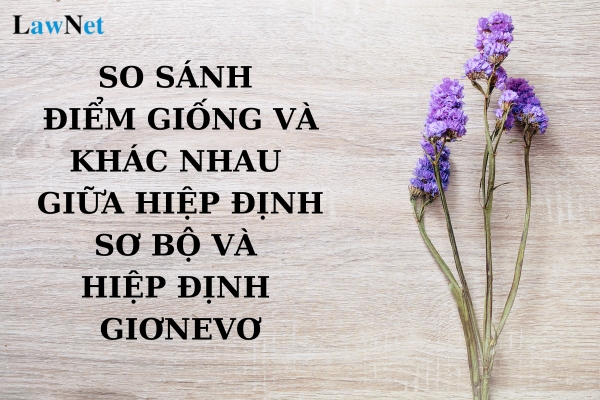Similarities and differences between the Accord Between France and the Democratic Republic of Vietnam and the 1954 Geneva Conference
Similarities and differences between the Accord Between France and the Democratic Republic of Vietnam and the 1954 Geneva Conference
* Similarities:
- Context: Both the Accord Between France and the Democratic Republic of Vietnam and the 1954 Geneva Conference were signed during a period when Vietnam was struggling for independence and freedom. They were both the result of a diplomatic struggle to protect Vietnam's independence and sovereignty.
- Content: Both agreements aimed to establish peace and recognize Vietnam's right to self-determination and freedom, albeit with different provisions and scopes.
- Significance: They both represent significant steps in Vietnam's struggle for independence, paving the way for further developments on the path to national unification and independence.
* Differences:
Below is a table comparing the differences between the Accord Between France and the Democratic Republic of Vietnam (March 6, 1946) and the 1954 Geneva Conference (July 21, 1954):
|
Criteria |
Accord Between France and the Democratic Republic of Vietnam (March 6, 1946) |
Geneva Conference (July 21, 1954) |
|
Historical Context |
- After the August Revolution, France returned to invade Vietnam. |
- End of the 9-year resistance war against France (1945-1954). |
|
Negotiation Parties |
- Democratic Republic of Vietnam |
- Democratic Republic of Vietnam. |
|
Main Content |
- France recognized Vietnam as a free state within the French Union. |
- Participating countries recognized Vietnam's independence, sovereignty, unity, and territorial integrity. |
|
Significance |
- Temporary solution giving Vietnam more time to prepare for prolonged resistance. |
- Ended the First Indochina War. |
|
Limitations |
- France did not fulfill the peace commitments, quickly returning to war. |
- The general elections to unify the country as committed did not occur, leading to prolonged division and the war against the USA. |
Note*: The content is for reference only!

Similarities and differences between the Accord Between France and the Democratic Republic of Vietnam and the 1954 Geneva Conference (Image from Internet)
What requirements must students in Vietnam meet in the subject of History?
Based on Section IV of the General Education Program in History issued with Circular 32/2018/TT-BGDDT (amended by Article 2 Circular 13/2022/TT-BGDDT), the requirements for studying History are stipulated as follows:
(1) Essential Qualities and General Competencies
The subject of History contributes to forming and developing essential qualities and general competencies in appropriate levels for the subject and educational level as defined in the general program.
(2) Specific Historical Competency Requirements
- The History program helps students develop historical competencies grounded in basic and advanced knowledge of world, regional, and Vietnamese history through a system of political, economic, social, cultural, and civilization history themes and topics. Historical competencies include: exploring history; understanding and historical thinking; applying acquired knowledge and skills.
- The specific expressions of historical competency are presented in the following table:
+ Exploring history:
(i) Identifying various types of historical documents; understanding, exploiting, and utilizing historical documents in learning processes.
(ii) Recreating and presenting through spoken or written forms the sequence of historical events, personalities, and processes from simple to complex; identifying historical events in specific spaces and times.
+ Understanding and historical thinking:
(i) Explaining the origins, development of historical events from simple to complex; indicating the development process of history diachronically and synchronically; comparing similarities and differences among historical events, explaining causal relationships within historical progress.
(ii) Providing personal opinions, assessments on historical events, figures, processes based on historical comprehension and thinking; understanding continuity and change in history; thinking in various directions when considering, evaluating, or seeking answers about a historical event, figure, or process.
+ Applying acquired knowledge and skills:
(i) Drawing historical lessons and applying historical knowledge to explain real-life issues; thereby, having the ability to independently explore historical issues, developing creative power, being capable of accessing and processing information from different sources, with a consciousness and ability for lifelong historical learning.
What are the objectives of the History curriculum in Vietnam?
Based on Section III of the General Education Program in History issued with Circular 32/2018/TT-BGDDT (amended by Article 2 Circular 13/2022/TT-BGDDT), the objectives of the History curriculum are defined as follows:
- The History curriculum helps students develop historical competency, which is an expression of scientific competence formed in secondary education;
- Contributing to educating the spirit of nationalism, patriotism, good traditional values of the nation, and cultural essence of humanity, qualities, competencies of Vietnamese citizens, global citizens suitable to the development trends of the era;
- Helping students approach and clearly recognize the role, characteristics of historical science as well as its connection with other scientific fields and professions, establishing a foundation for students' future career orientation.

